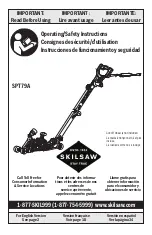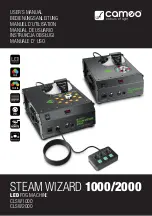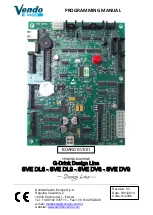
5
Additional Safety Warnings
GFCI and personal protection devices like
electrician’s rubber gloves and footwear will
further enhance your personal safety.
Do not use AC only rated tools with a DC
power supply.
While the tool may appear to
work, the electrical components of the AC
rated tool are likely to fail and create a hazard
to the operator.
Keep handles dry, clean and free from oil
and grease.
Slippery hands cannot safely
control the power tool.
Develop a periodic maintenance schedule
for your tool. When cleaning a tool be care-
ful not to disassemble any portion of the
tool since internal wires may be misplaced
or pinched or safety guard return springs
may be improperly mounted.
Certain clean-
ing agents such as gasoline, carbon tetrachlo-
ride, ammonia, etc. may damage plastic parts.
Risk of injury to user.
The power cord must
only be serviced by a Bosch Factory Service
Center or Authorized Bosch Service Station.
Some dust created by
power sanding, sawing,
grinding, drilling, and other construction
activities contains chemicals known to
cause cancer, birth defects or other repro-
ductive harm. Some examples of these
chemicals are:
• Lead from lead-based paints,
• Crystalline silica from bricks and cement
and other masonry products, and
• Arsenic and chromium from chemically-
treated lumber.
Your risk from these exposures varies, de-
pending on how often you do this type of work.
To reduce your exposure to these chemicals:
work in a well ventilated area, and work with
approved safety equipment, such as those
dust masks that are specially designed to filter
out microscopic particles.
NOTE:
For OSHA Silica dust compliance
information see www.skilsaw.com/OSHA
sharp edges etc. Avoid bouncing and
snagging the accessory.
Corners, sharp
edges or bouncing have a tendency to snag
the rotating accessory and cause loss of con-
trol or kickback.
Do not attach a saw chain, woodcarving
blade, segmented diamond wheel with
a peripheral gap greater than 10 mm or
toothed saw blade.
Such blades create fre-
quent kickback and loss of control.
Do not “jam” the wheel or apply excessive
pressure. Do not attempt to make an exces-
sive depth of cut.
Overstressing the wheel in-
creases the loading and susceptibility to twist-
ing or binding of the wheel in the cut and the
possibility of kickback or wheel breakage.
When wheel is binding or when interrupt-
ing a cut for any reason, switch off the
power tool and hold the power tool motion-
less until the wheel comes to a complete
stop. Never attempt to remove the wheel
from the cut while the wheel is in motion
otherwise kickback may occur.
Investigate
and take corrective action to eliminate the
cause of wheel binding.
Do not restart the cutting operation in the
workpiece. Let the wheel reach full speed
and carefully re-enter the cut.
The wheel
may bind, walk up or kickback if the power tool
is restarted in the workpiece.
Support panels or any oversized work-
piece to minimize the risk of wheel pinch-
ing and kickback.
Large workpieces tend to
sag under their own weight. Supports must
be placed under the workpiece near the line
of cut and near the edge of the workpiece on
both sides of the wheel.
Use extra caution when making a “pocket
cut” into existing walls or other blind ar-
eas.
The protruding wheel may cut gas or wa-
ter pipes, electrical wiring or objects that can
cause kickback.
Summary of Contents for SPT79A
Page 53: ...53 Notes Remarques Notas ...
Page 54: ...54 Notes Remarques Notas ...
Page 55: ...55 Notes Remarques Notas ...






































